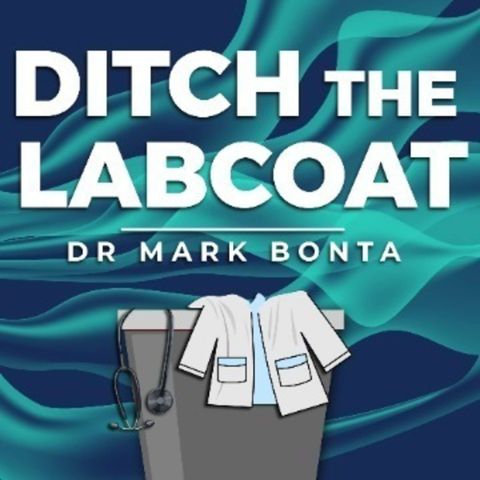18 SEP. 2024 · DISCLAMER >>>>>> The Ditch Lab Coat podcast serves solely for general informational purposes and does not serve as a substitute for professional medical services such as medicine or nursing. It does not establish a doctor/patient relationship, and the use of information from the podcast or linked materials is at the user's own risk. The content does not aim to replace professional medical advice, diagnosis, or treatment, and users should promptly seek guidance from healthcare professionals for any medical conditions.
>>>>>> The expressed opinions belong solely to the hosts and guests, and they do not necessarily reflect the views or opinions of the Hospitals, Clinics, Universities, or any other organization associated with the host or guests.
Disclosures: Ditch The Lab Coat podcast is produced by (https://podcastsins.trafft.com/) and is independent of Dr. Bonta's teaching and research roles at McMaster University, Temerty Faculty of Medicine and Queens University.
Welcome to "Ditch the Lab Coat," the podcast where we dive into pressing health issues with scientific skepticism and heartfelt curiosity. I'm your host, Dr. Mark Bonta, and in this episode, we are back with our second part to the two-part series focused on the intricate world of addiction treatment.Joining us today are two distinguished guests: Dr. Jon Mong, a general internal medicine and addictions physician, and Dr. Wiplove Lamba, an addiction psychiatrist. Together, Dr. Mong and Dr. Lamba will shed light on the promise and perils of new treatment approaches, underscore the necessity of comprehensive support systems, and point to the pivotal role of social supports and stable housing in fostering sustainable recovery.We also tackle the cultural and historical context of the opioid crisis, including the profound impact of Purdue Pharma and the Sackler family. Dispelling misconceptions about fentanyl, you'll learn about the real risks, the invaluable role of naloxone, and practical steps for overdose prevention.This episode is not just about groundbreaking therapies; we will discuss the critical need for rigorous, high-quality data to back new treatments and reflect on the significant influence of private companies in the field. Our guests will emphasize the paramount importance of addressing the root causes of substance use, building life skills, and creating supportive networks to prevent relapses.Lastly, this episode will feature discussions on opioid tolerance, withdrawal management, and the nuanced balance between the risks of prescribing medications versus the risks of untreated withdrawal. You’ll gain insights into how healthcare teams can shift their perceptions and practices to better support patients with substance use disorders
Stay tuned as we unravel these topics and much more. So, grab your headphones and get ready for an enlightening conversation on addiction treatment with Dr. Jon Mong and Dr. Wiplove Lamba. Let's dive in!
04:17 Challenges and future of addiction treatment discussed.
09:36 Understanding withdrawal challenges in hospitals with unknown dosages.
12:02 Provide proper care despite addiction-related complications.
16:20 Colleague's guarded due to personal trauma, concerns.
20:05 Conversations led hospital to adopt PICC lines.
21:54 New grads integrate social responsibility with medical care.
27:20 Risk from checking on overdose is minimal.
29:15 There can't be too much widely accessible Narcan.
34:00 Need rigorous study for psychedelics in treatment.
35:39 Concerned new treatments overshadow foundational patient support measures.
41:40 "Cured" involves functional life, stability, coping mechanisms.
42:52 Substance use disorder: Patients can achieve long-term remission.
46:01 Meet needs without substances to avoid relapse.


